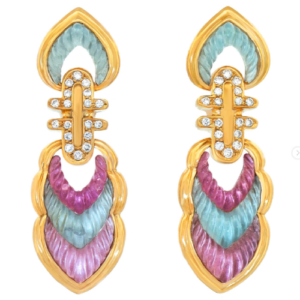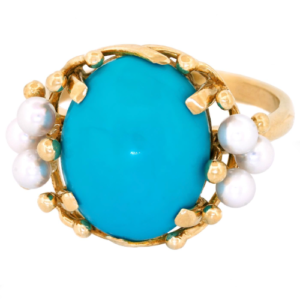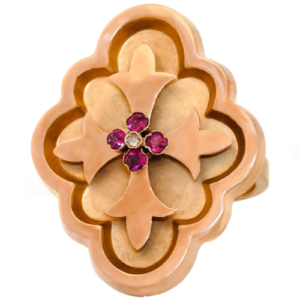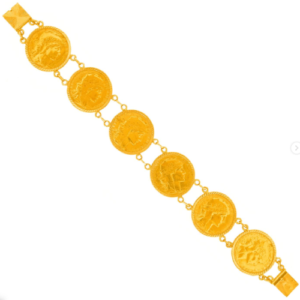Episode 203
What you’ll learn in this episode:
- How to know when to walk away from a purchase, and how to trust your intuition when buying
- Why you should always ask for a detailed receipt, even if it feels awkward
- Commonly misunderstood phrases dealers may use to confuse buyers
- How Jeff does due diligence before making a purchase
- How to navigate the many platforms where you can purchase jewelry today
About Jeff Russak
Jeff Russak is principal of Lawrence Jeffrey Estate Jewelers. Jeff’s expertise in antique and 20th century jewelry combined with an uncompromising attitude toward quality, condition, and style directs the acquisition process. His proficiency in signed pieces and hallmarks is especially useful in identifying and dating each piece. In demand as a speaker on antique jewelry at museums and shows, he also volunteers as a guest appraiser for charity.
Additional Resources:
Photos (From LJ’s Instagram):
Soooo eighties, so valley girl Carved Aquamarine, Tourmaline, and Diamond Earrings… the look is … easy breezy California!

Organo-Chic Opal Ring, Sixties German Post Modern Chic…oceanic, galactic, mythic… handmade, 18k and very very heavy

Mings of Hawaii Sixties Turquoise and Pearl Ring…effortless everyday chic

Gothic pop art ring American sixties style! Think posh motorcycle jewelry on the cover of Vogue, authentic American cool!

French Art Deco Gold Coin Bracelet. The 20 Franc coins make it extra special

Transcript:
When it comes to buying jewelry, nothing is more important than trust. That’s why Jeff Russak, principal at Lawrence Jeffrey Estate Jewelers, won’t hesitate to leave a purchase behind if his inner voice tells him something is wrong. He joined the Jewelry Journey Podcast to talk about how he vets his purchases and the dealers he works with; what red flags buyers should watch out for; and why a receipt is more powerful than you might think. Read the episode transcript here.
Sharon: Hello, everyone. Welcome to the Jewelry Journey Podcast. This is the first part of a two-part episode. Please make sure you subscribe so you can hear part two as soon as it’s released later this week.
Today, my guest is Jeff Russak, one of the principals of Lawrence Jeffrey. They are estate dealers located in Litchfield, Connecticut. Jeff has had decades of experience buying and selling. He’s also extremely knowledgeable about estate jewelry. Along the way, he has learned about what a good dealer should be doing and what you should know in order not to be taken advantage of. There are lots that dealers know about good dealers that the ordinary buyer doesn’t know. He will fill us in on some of that today. Jeff, welcome to the podcast.
Jeff: Thank you for having me. I’m thrilled to be here.
Sharon: I’m so glad to have you. This is the second time you’ve been on. I’m glad you decided to come back.
I bought a diamond tennis bracelet several years ago—well, a long time ago—that I was told was Art Deco. Then, when I showed it to somebody else, they said, “That cut wasn’t done until the 80s.” I still like the bracelet, but how could I have avoided that without knowing everything there is to know about diamonds?
Jeff: That’s a really great question, and it’s actually kind of a complicated one. The person who looked at it did something which is very basic. They looked at the cut of the diamonds. That’s one of the things I do when I’m determining the age of any piece. We look at the stones. We have a good general idea of when different cuts, for diamonds or otherwise, were established.
The short answer is I think the only way you could have avoided that would have been to have a better handle on whether this dealer is expert enough to make that determination or not. That can be a hard thing to do. We’ve talked about how to buy, and a lot of how to buy is all about who you decide to trust. I think for the average buyer, figuring out who you trust and who you feel comfortable with is really the bottom line.
I’ll tell a story about one of our better clients. We didn’t know this for years, but they’re people who have become friends. They started buying from us when we were very new to the business. They didn’t buy just jewelry, but they bought decorative arts. We didn’t know it, but every single piece they bought from us was going to one of the top appraisal firms in New York and being appraised and verified. After quite a number of years, they told us this. That that was one of the reasons why they kept coming back, because everything was O.K. We passed the test for authentication and for value. Perhaps that’s a bit extreme for most people, but it’s certainly one way.
I would say it’s listening to that little voice in your head. I think today a lot of what I’d like to talk about is how I buy, because the way I buy is no different from the way I recommend that everybody buys. Of course, there are things I know that an average buyer is not going to know, but a lot of what I do is simply being a good detective and listening to that voice in my head. When the voice in my head says, “Don’t buy something,” even a little bit, I just don’t buy, or when the voice in my head says, “I don’t know if this relationship is for me.” Maybe I think the person is a lot smarter than I am. That happens. So, how am I going to know I’m making the right connection, buying for the right price so I can present pieces to my clients for the right price? A lot of it is your instincts. Trust your instincts. It’s so tempting to buy something that looks great or you’ve been told is great or you’ve been told is a good deal, but if you don’t have that sense, that feeling you should, then you shouldn’t.
Sharon: Is that how you buy all the time or most of the time?
Jeff: That is definitely part of what I do. It’s a big part. We tend to make relationships, and we buy a lot from individual relationships. Some buyers are like bees who are busy pollinating every flower in the field. I think that’s really funny. If that’s your style, I think you should do it and you should enjoy it. That’s a different risk level and a different set of rules. If find people who I really trust, people who are open and transparent with me, who answer my questions in a very forthright way, then those are the folks I go back to again and again. I have the same advice for anyone.
Sharon: Are they here or are they in Europe? Are they everywhere?
Jeff: They are everywhere. I have great contacts in the U.S., and I mean contacts from dealers that I might see in a flea market. I have a couple of local folks who run estate sales. One of them is the finest generalist I know. He is so incredibly smart and knowledgeable. I totally trust him. If I ask a question, he tells me what he knows and what he doesn’t know.
Sharon: If he or one of these people that you trust called you up and said, “I have a piece I think you’ll really like. I don’t know anything about it, but I think you’ll really like it,” and maybe they’re far away or you don’t want to go, will you buy it sight unseen?
Jeff: This goes back to what you and I discussed briefly. I think it’s all about the return policy. Yes, I will agree to buy something, but I don’t think it’s sight unseen anymore. They’re naturally going to send me a picture using smartphones. That technology is great, but the pictures don’t always tell the whole story. Someone who’s really honest doesn’t have any fear of taking something back if it doesn’t work for the client. I don’t think there’s anyone I deal with who won’t take a piece back if it’s not quite right for me.
Sharon: It’s interesting you say that. It’s probably true, but I hadn’t thought about it. There probably isn’t anything that’s sight unseen anymore with the internet and everything.
We talked a little bit about receipts. Should we make sure we have the receipt?
Jeff: The rules for everyone are the same. There are a lot of laws in place, mostly federal laws. Some of them are laws that relate specifically to jewelry. There are several pages of regulations, and also there are laws that simply are contract law. Your receipt is your contract. You need to ask that every piece of information is included on the receipt.
Let’s say you’re buying a diamond ring and it’s supposed to be by Cartier. You want to know that it’s 18-karat gold. You want to know what the diamond grade is. You want to know about the color and clarity. I want to be clear that I’m not trying to create an environment that’s very hidebound. We all understand that people do their best to approximate, but they need to be close, let’s say. So, you’re going to want the diamond colors and clarities, and then you’re going to want it to say, “authentic Cartier” or “this ring is by Cartier.” Here’s a little trick: if they say, “This ring is signed Cartier,” that doesn’t mean it has to be made by Cartier.
Sharon: Who is it made by?
Jeff: It could be made by you and me and we got someone to engrave the word “Cartier” on it. Signed Cartier does not mean it is Cartier. It means they are guaranteeing that the word “Cartier” is on the piece. “Authentic” Cartier or “by Cartier” means that it is Cartier. There are quite a number of situations, especially online, where you do often see the phrasing “signed Tiffany,” “signed Cartier,” “signed Van Cleef & Arpels.” Now, they may fully mean that it is, but I’ve seen quite a number of situations where it was clear it wasn’t.
Sharon: You’re asking for a lot; maybe a lot that people don’t put on the receipt normally. Have you had any push back? Were people getting annoyed with you?
Jeff: No, I think this is really simple. At my shop and at shows, I have definitely been asked to include all the information on my tag, which is all the information I’ve mentioned and more. People have said, “I would really like that on the receipt. Could you make sure it’s on there?” I think if you get pushback, then I would decline to buy the piece no matter what. If they’re someone who can’t write that information on a receipt, for me, suddenly, there are alarm bells. Something is wrong. Now, maybe it’s just a person who doesn’t like doing that. That’s possible, and they’re a totally honest person, but if they don’t want to put the information regarding the piece on the receipt, that’s a problem. You have no recourse because your receipt does not state the proper information.
Here’s the deal: that contract is forever. People will tell you you can’t return things. People will tell you, “Oh, that was two years ago. That’s expired.” If it says 10 carats of diamonds and it’s only five carats, you can return it. You can return it tomorrow. You can return it in five years. Your grandchildren can return it in a hundred years. That’s a contract that has to be accurate. It doesn’t matter. It could be tractor parts.
Sharon: It’s easier for you. If I see a piece and I have fallen in love with it—if you want it, you overlook a lot, whereas you can say no to a lot and pick out one where you think the person is trustworthy. Is it easier for you?
Jeff: I think you’re making a good point. I made some notes before we started. Here’s what I wrote about this: this is how I buy, but there are various rules. Let’s just say we’ve discussed them. If I think I should start spouting the law, I remind myself to zip it and just move on. There’s lots and lots to buy. It’s not my job to tell people what the law is. It’s not my job, except on this podcast.
The thing I’m not comfortable with is when someone skirts the law and won’t make a proper contract. If you were buying a house and they refused to get a survey, I would say, “Hey, something’s up.” I think it’s reasonable to ask for a proper receipt, always, and it doesn’t matter whether it’s Walmart or Sotheby’s or any number of famous dealers I can name all over the country. It’s perfectly fine, and anyone who is selling things in an honest way won’t have any problem with that. If it is what they say it is, why not write it? This shouldn’t be any issue. I understand it’s uncomfortable.
Sharon: I’d rather somebody tell me, “I don’t know,” than guess and say, “I don’t know what it is. I don’t what it’s made of,” that sort of thing.
Jeff: That’s a great point. I would much rather people tell me, “I don’t know.” But here’s the thing: the “I don’t know” price should be half of the “I think it’s a sapphire” price, or maybe a quarter. “I don’t know” means the price should be falling, falling, falling. If you say, “Oh, this is a beautiful turquoise necklace,” is it natural turquoise or is it reconstituted? Now, by law, they’re required to tell you. If they say, “I don’t know,” the law then requires you to insist they find out.
Once again, it’s uncomfortable. If they say, “I don’t know,” chances are you really should just walk away. Let’s say this gorgeous turquoise necklace is gold. It’s got all of these stones, and it’s $12,000. Well, $12,000 is a lot in my world. Maybe it’s not that much money to other people, but “I don’t know” doesn’t go together for me.
Sharon: That’s interesting. I’m coming from the items I bought when I started getting into jewelry. Now I know a little bit more. For instance, there are people who seem to have a natural affinity for detail I don’t have. They can tell. I’m thinking of a girlfriend who once said, “That’s not an Art Deco. That’s an Edwardian piece.” It was, and I thought it was Art Deco. I thought she was ridiculous.
Jeff: I think it’s amazing when people know. There are lots of people who are so good at that. I think as a buyer, you should—I’ll go back to what I said in the beginning. You find someone who you trust and who’s going to explain to you what you’re buying, and who will rely that on the receipt and who wants to have an ongoing relationship with you. If you have a problem, they will sort that problem out. Look, Jeff Russak at Lawrence Jeffrey is not made of sold gold. He does not have a brain the size of a Volkswagen. We make mistakes. When we make mistakes, we have to fix them. That’s the way it is.
Sharon: I’ve heard the phrase, “Somebody has a dealer’s eye.” Do you think there’s such a thing as a dealer’s eye?
Jeff: I think there is. I think what that refers to is someone who just knows when something is a good deal. I have a customer. When I get a piece I know is a good deal, that we bought well and the retail price is a great price, I tease her and say, “You’re like a hound. You can smell the jewelry, that there’s a deal.” I think that’s totally true, absolutely.
Sharon: That’s interesting. Well, I certainly don’t have that. If a display case says that all the gems or stones inside are certified, what does that mean?
Jeff: That actually doesn’t mean anything at all. It’s meaningless. This is where we need to start being detectives. The question is certified by whom?
Sharon: Well, who can certify them?
Jeff: People often think it’s a government agency, or they think, for instance, that it’s a lab like the GIA, or they think the dealer is certifying. A dealer who’s smart, who’s on the up and up, isn’t going to certify anything. Certifying means you agree that the information is true. Most appraisals, for instance, are very careful to have at the end something that says, “We’ve done our best job to approximate, to use our knowledge to establish what things are,” and then when they say, “I duly sign,” or “I hereby certify,” all they’re certifying is that the signature is theirs. They’re not certifying the information. They’re saying, “We’ve done our best job.” They probably have, and the information is probably correct, but certifying is different.
Like at the GIA, when you study to become a gemologist, they wrap your knuckles with a ruler if you say certificate or certify. They don’t certify things. They produce laboratory reports. It’s a report, not a certificate. It doesn’t certify anything. It is a laboratory process they have performed to the best of their abilities, which is pretty darn good.
Sharon: We will have photos posted on the website. Please head to TheJewelryJourney.com to check them out.

